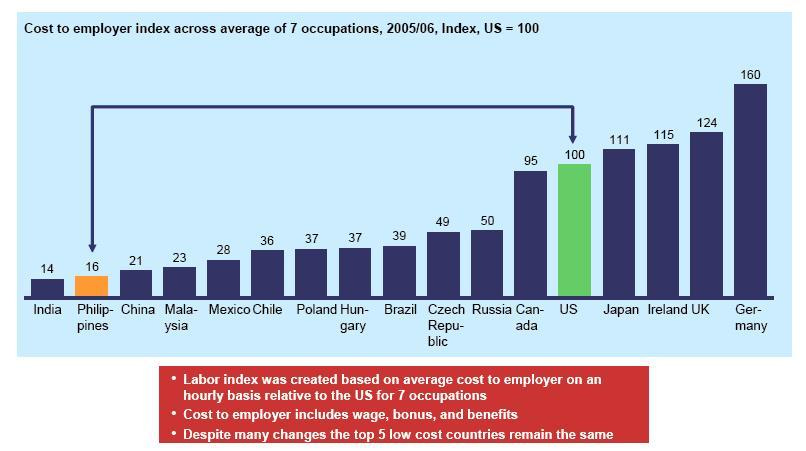Hello, This is Manila. How Can I Help You?
Outsourcing in the Philippines - a burgeoning business
Originally posted on March 7, 2010
Last week I tried to pay my credit card bill online. Using a different computer, the site wanted to verify my identity with a security question – “what is the name of your elementary school?” After three failed attempts, the system locked my account, forcing me to call to re-activate. When I called Capital One, the girl on the other end of the line spoke perfect English, though she had a slight, almost unnoticeable accent that has become very familiar to me over the last three months. I asked where she was located, and she said Manila.
In order to get into the Philippines, you need a flight out of the country. Back in November I booked a refundable ticket from Manila to San Francisco on United Airlines. The other day I called up to cancel the flight and collect my cash. The girl picked up the line and same song, second verse. I asked if she was calling from Manila, and she confirmed – Makati, to be more specific. “I was just in Makati for a conference,” I said. “Yes, this is the business center of Manila, sir,” she responded. I felt better knowing that I was dealing with a Filipino on the other end of the line.
If you call customer service for a major multi-national corporation – a bank or an airline, for example – there is a good chance you will be routed to Manila and will speak to a Filipina. Her superior command of the English language will lead you to believe you are buying American, and her positive demeanor will leave you feeling satisfied with the interaction. This, among other reasons, is why the Philippines has one of the fastest business process outsourcing (BPO) industries in the world. The call center industry, in particular, which accounts for the majority of BPO in the Philippines, is highlighted in an article from the Wall Street Journal:
The Philippines’ share of the industry ?? the business of helping people rectify computer problems, pitching magazine subscriptions and other time? consuming tasks ?? has risen from virtually zero a decade ago to 15% today, the No. 2 spot, according to Dallas?based Everest Research Institute.
Meanwhile, India’s share of the global business?processing market, while growing in value, has fallen to 40% from about 80% in 2004 as the industry spreads to other parts of the world.
This shift isn’t because of a sudden aversion to India. India?based call centers still lead the industry, racking up $11 billion in revenue last year, according to the New Delhi?based National Association of Software and Services Companies, compared with the $6.8 billion earned by Philippines?based providers. India’s $29 billion?a?year sector for information?technology services dwarfs other contenders.
The BPO market generates hundreds of thousands of jobs for Filipinos, typically at much higher salaries than in other industries. In addition, the qualifications to become a call center operator are high. Proficiency in American-style English is a must, as is a college degree. The next time you call to complain about your cable bill, you might be speaking to someone with a degree in mathematics, economics, or computer science.
The Philippines has one of the lowest labor costs in the world.
Labor costs here are a fraction of the U.S., and the government is becoming more business-friendly when it comes to this type of work. The leading contender for vice-president and former secretary of the Department of Trade and Industry, Mar Roxas, introduced the Philippines to the business world in 2001:
That’s why during his time as DTI Secretary, he launched the program “Make IT Philippines”, where he brought the biggest global industry players in Business Process Outsourcing (BPO) to the country, encouraging them to build call centers and invest in Filipino talent. Ridiculed for his efforts at the start, the success of the industry, which now directly employs over 400,000 Filipinos, has vindicated Mar.
Campaign rhetoric is excessive here (not unlike anywhere else), but the point is salient. Outsourcing seems to follow a specific trajectory. First, a country with comparatively low labor costs offers a competitive advantage and major cost savings for labor-intensive work. Some innovative entrepreneurs and foreign companies, with the backing of the government, open facilities to perform basic services – in this case, customer service. The industry matures, becoming more competitive in its search for talent and more expansive in its product offerings. Companies realize the potential in other services and branch out. Now, companies can offshore not only customer service, but programming, accounting, and back-office work as well. Medical transcription, for example, is a growing industry here. Why? Because doctors can send their recordings to an American company that will upload the recording and send it to Manila, where it will be transcribed and sent back at a fraction of the cost. Any labor-intensive service is fair game.
At first, the major players will be international corporations. One of the biggest call centers in the Philippines is called Convergys – a Cincinatti-based company. But homegrown companies also come to dominate the scene, as smaller players grow larger. The industry sees big investment dollars, and the economy grows commensurately. As people become richer, they spend more, lifting businesses across the country. In the case of China, the domestic market for the products it once outsourced becomes larger and larger.
Every country is unique, and I don’t know what the next ten years for the Philippine BPO industry looks like. But it is good to see my adopted home country becoming one of the dominant players in an estimated $180 billion sector.


